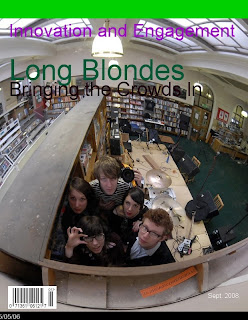Social networking sites are, for me, primarily a marketing opportunity for the library. If a presence is established in online social networks, then it is a great opportunity to draw new users to us. The trick is to attract current users to our online presence. If we can do that, then hopefully we can use that as a base to expand. Doing so however, is not as easy as it sounds. Someone else might have pointed it out already, but the Facebook group "State Library of New South Wales" has 30 members, whilst "I MAKE THE NSW STATE LIBRARY BADASS" has 179 members. I believe the trick to establishing an online presence in these networks successfully is to achieve the right mix between informality and authority. We don't wish to denigrate ourselves, but we do need to make any presence casual enough that clients are attracted to it and are relaxed enough to engage with us through our online presence. An overly formal presence reinforces our image as stern gatekeepers, and effectively discourages clients from talking to us. And that's the second use of these networks: to engage with our clients. A greater online presence allows us to have a discussion with our clients in regards to what they see as our successes and failures, and what we can do to improve our services. By observing any discussions between themselves, we can also gain further insight into how they use the library and its services.
I think some of that might have actually been coherent.
Tuesday, September 16, 2008
Google docs
I can see the usefulness of this. Obviously clients frustrated by the lack of Office applications on the reading room PCs find Google docs useful. The other use for these applications is for people who travel a lot and lack a laptop. They could access their documents wherever they are (assuming there's net access).
For the library itself, I'm not so certain it could be used for work by staff. We already have a network for common access to documents, and the capability to restrict access to anything that might need it. Also, for professional purposes, they may not provide enough features that are required.
It would be useful for anyone working with colleagues in other institutions, be it in public libraries or the other state libraries. There are also possibilities for those who work with suppliers and publishers. I imagine there would be issues surrounding any sensitive documents though. Would we trust our documents to be stored on servers and equipment outside the library?
For the library itself, I'm not so certain it could be used for work by staff. We already have a network for common access to documents, and the capability to restrict access to anything that might need it. Also, for professional purposes, they may not provide enough features that are required.
It would be useful for anyone working with colleagues in other institutions, be it in public libraries or the other state libraries. There are also possibilities for those who work with suppliers and publishers. I imagine there would be issues surrounding any sensitive documents though. Would we trust our documents to be stored on servers and equipment outside the library?
Wednesday, September 3, 2008
Can I have some salt with my mash?

Ok here is my mash-up, put together very hastily I should add. Its a photo of one of my favourite bands when they performed at Lancaster Library. Its a good way of getting people to come to the library, and certainly draws publicity. I'm not sure what the clients actually using the library might think though.
I don't see too much to get excited about with using mash-ups at the library. At first glance there's nothing new about it. Its basically the same ideas that have been used in computer publishing and design for years. It would be very interesting though to let the clients loose with the library's pictures collection (digitised of course) and see what they turn out.
Subscribe to:
Comments (Atom)